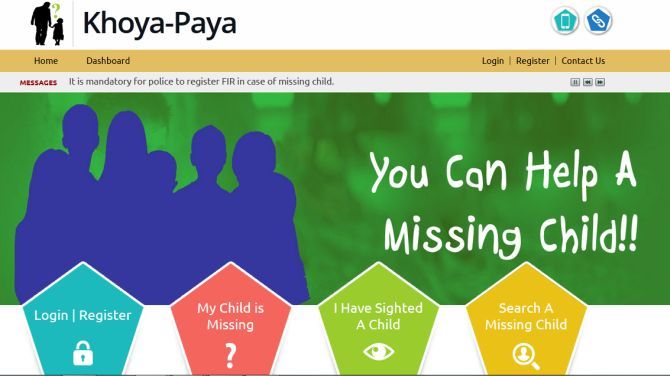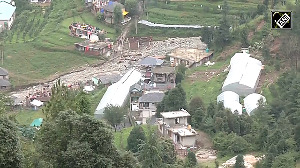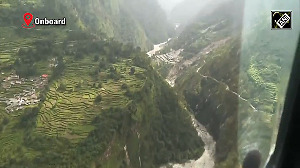
A new government website allows anyone, parents and citizens to upload details/photos of missing children as well as ones found to be abandoned, lost etc. Naveen Yadav, the official in charge of the venture, explains how the website will help in reuniting the child with the parents.
Eleven children go missing every hour in India. Many are found and restored to their parents. But many are not traced.
The Government of India has now started an initiative to help find the missing child. Khoyapaya is a website that has been launched by the ministry of women and child development.
In an email interview, Naveen Yadav, the under-secretary in the ministry and officer in charge of this endeavour, tells A Ganesh Nadar/Rediff.com how this website will help find missing children.
When a child goes missing and the details are uploaded on Khoyapaya, what does your department do?
The information uploaded by any citizen would be published after due diligence. Further, the information regarding missing children will be shared with police and Childline 1098 (a 24-hour helpline for children in distress) to make coordinated efforts in locating the child.
When a child is found and the details are put on Khoyapaya, how do you follow up on it?
Information about a sighted child will be shared with the police of the district the child is missing from and Childline India Foundation.
When you find a missing child and upload his/her photo on Khoyapaya -- do you have face recognition technology that will match it with an earlier photo, if the child has been reported missing on your website?
At present the search can be done with pre-defined parameters. The option for software for auto matching may be made available in future.
You have said that we can know the efforts that have been made to trace a missing child on your website -- how do you propose to maintain and update this data?
No. This portal is about sharing of information.
Eleven children are said to disappear in our country every hour. What is the capacity of your website? How many queries can it handle at any given time?
Any number of cases can be reported on the website.
How many people do you have working on this website? Is it manned 24 hours?
At present the website is handled by moderators and a supervisor. However, it may be made 24x7 soon depending on the case load.
When someone reports a missing child or finds a child and reports it on your website, what exactly do you do?
The information put up on the website is first scrutinised and if found in order it is made public.
The website was launched on June 2. What about the children that have gone missing earlier, will that data also be uploaded on this website?
Any citizen can upload data of missing children prior to that date also.
When a person reports a missing child at a police station but does not register it on Khoyapaya, will the police upload the details on your website?
If an FIR is registered by the police about a missing child, the police will upload it on TrackChild (a missing children website run by the police). However, a citizen or parents can upload missing case details on the portal.
There is already a government website, ‘Track the missing child’, which the police operate -- will the database for both websites be the same? How do you avoid duplication of work?
The TrackChild portal is a formal system and regulated as per the provisions of the Juvenile Justice (care and protection of children) Act 2000. Information about a missing child is uploaded on TrackChild portal after an FIR is registered by the police and information of a recovered/ found child is uploaded on the order of the Child Welfare Committee.
However, Khoya-Paya is a platform for citizens and parents to exchange information and search for missing children and to report a child sighted as abandoned, lost and with suspicious persons. This is in addition to the TrackChild portal.











